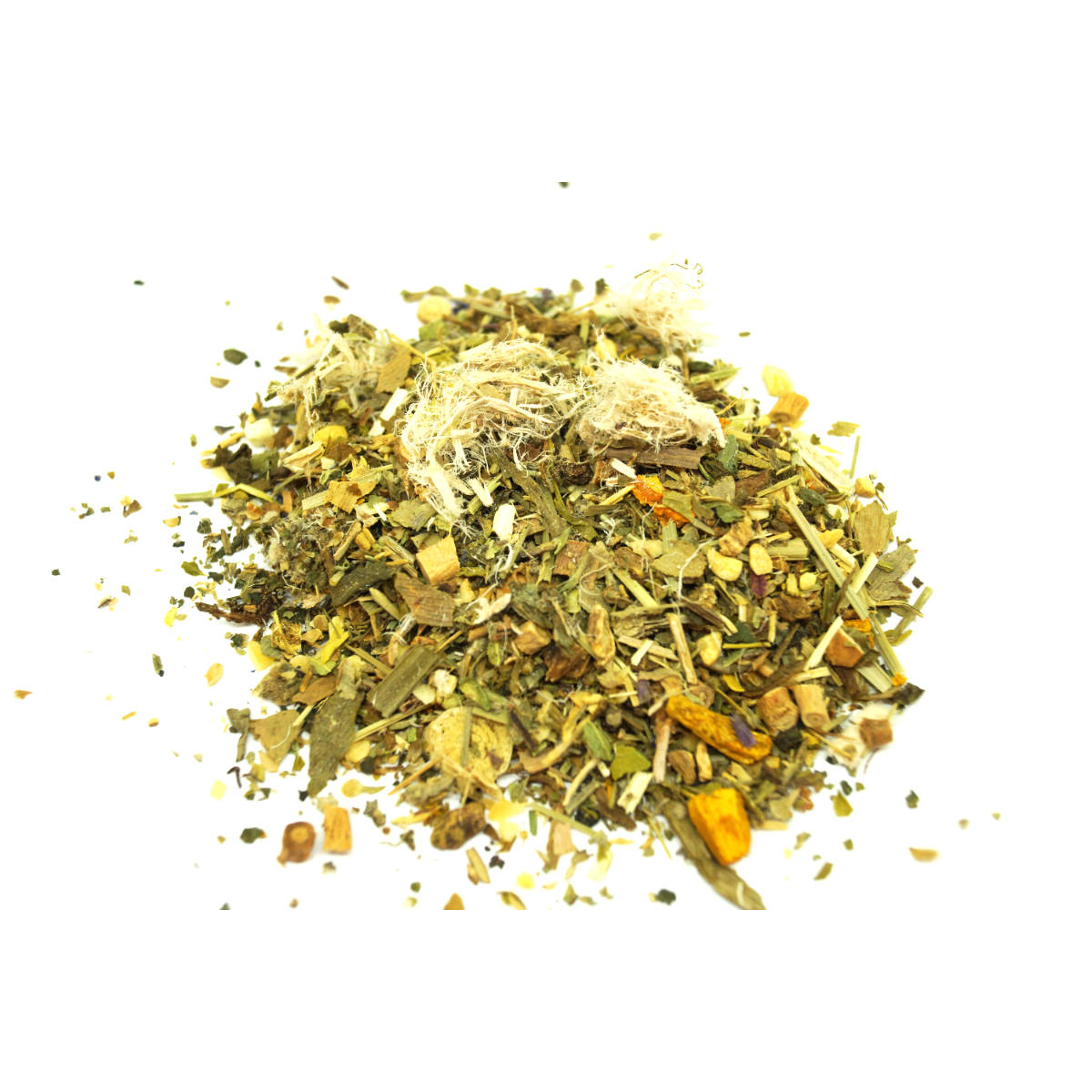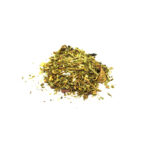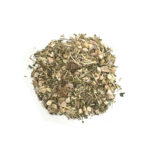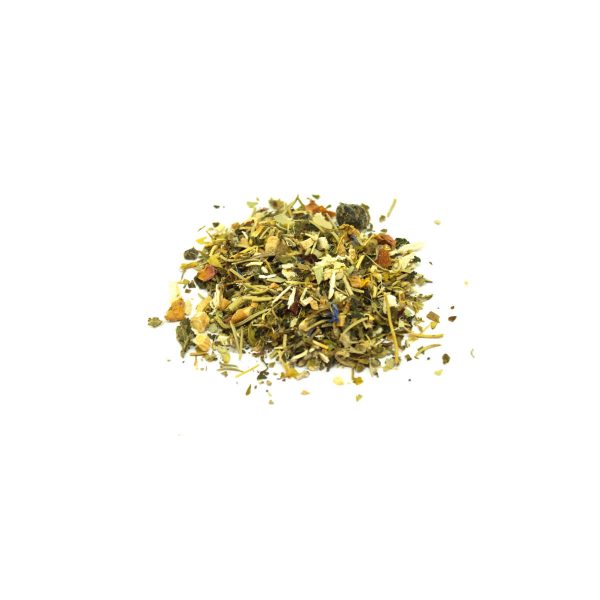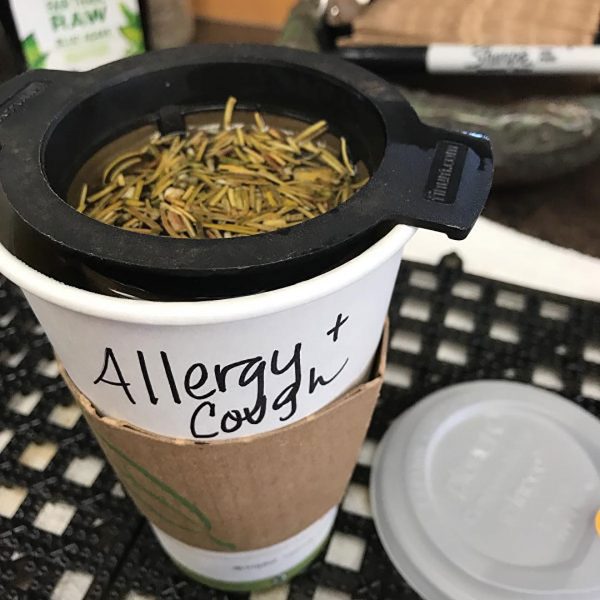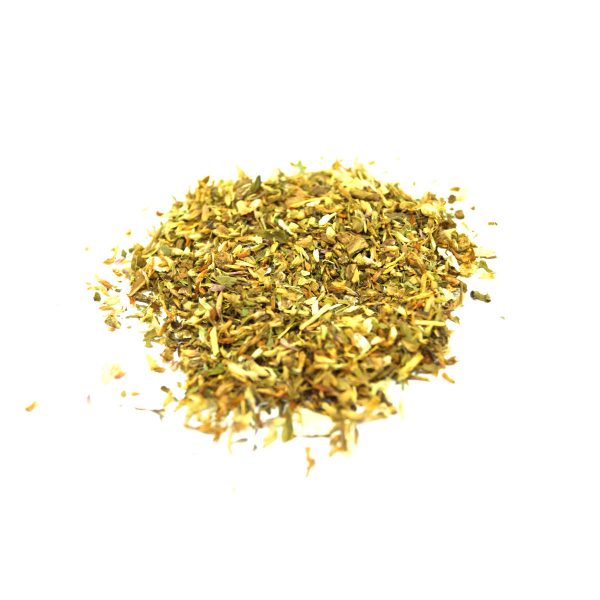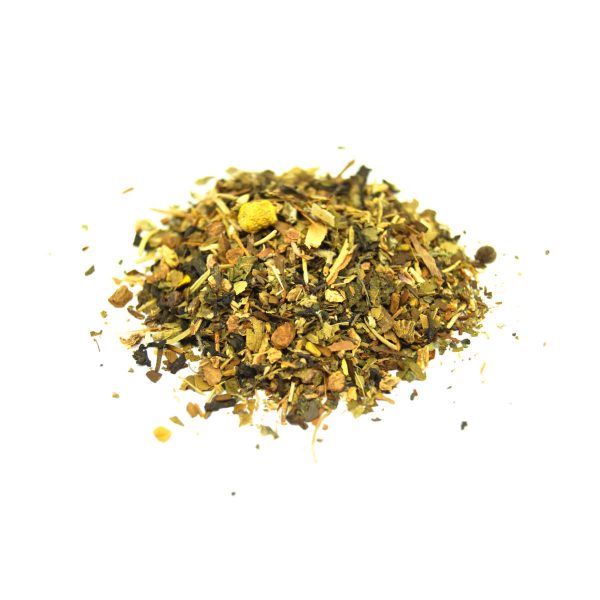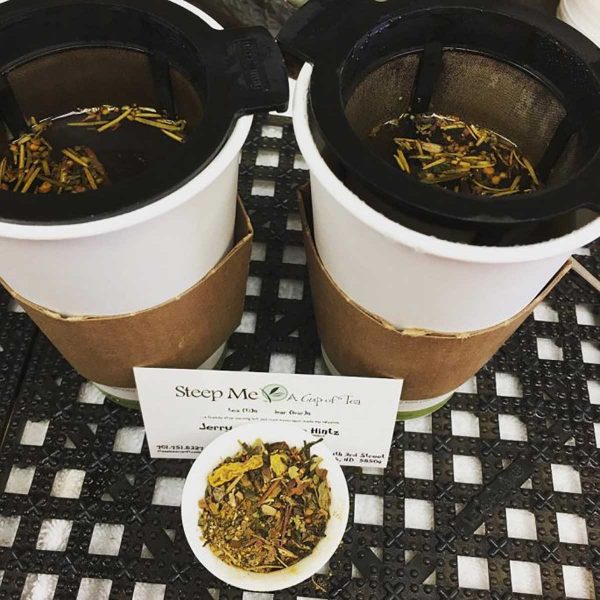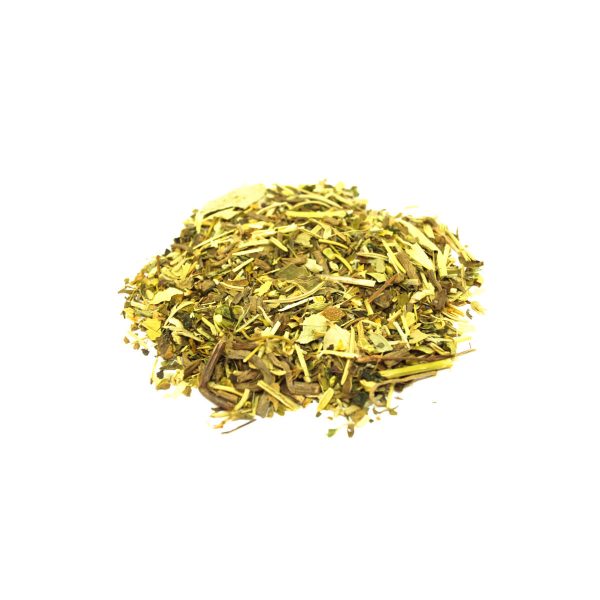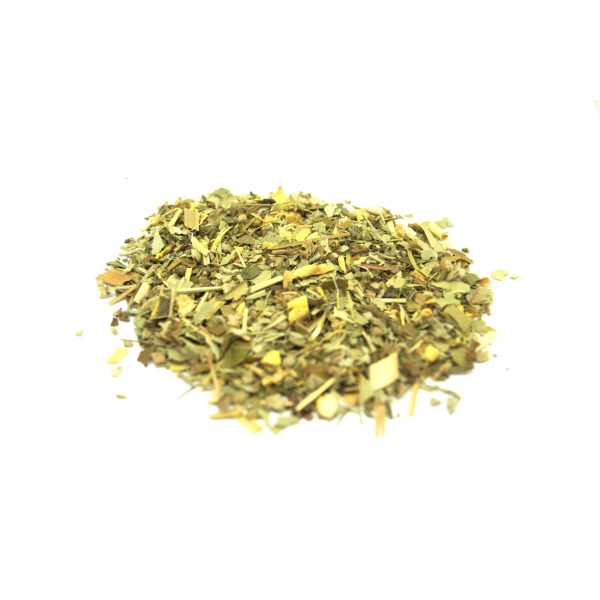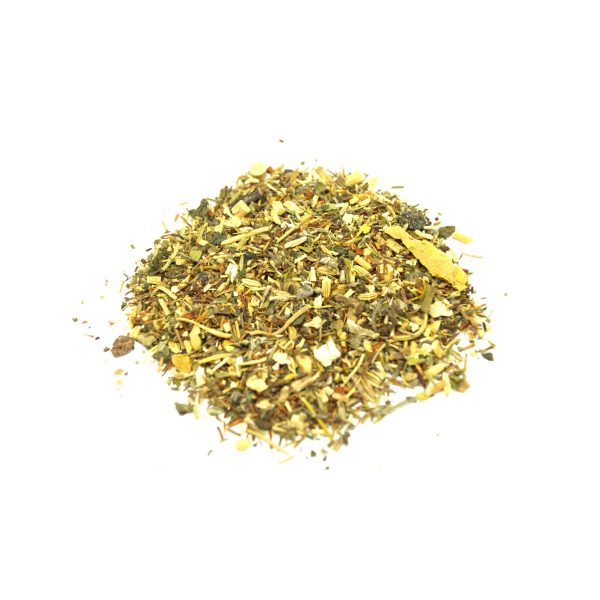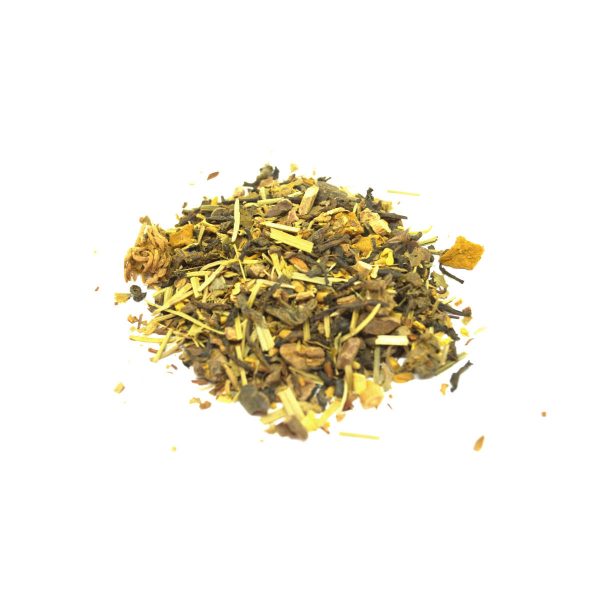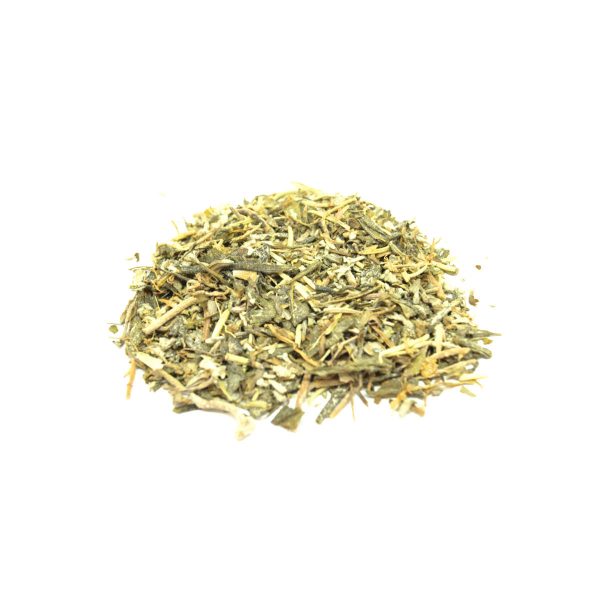Blender’s Notes Asthma:
Steep Me Self-Help combinations are a wonderful way to get health benefits outside of the standard tea leaf. This combination of herbs helps the body with Asthma symptoms. Hyperresponsiveness and chronic inflammation are two of the key drivers of asthma. Airway hyperresponsiveness is when the airways over-constrict in response to a trigger (often an allergen). This causes a narrowed airway which in turn leads to breathing difficulties and a lack of oxygen in the body. Chronic inflammation causes airway constriction, excess mucus production, as well as lung tissue scarring, and stiffness. Tissue stiffness, or fibrosis, which occurs causes parts of the lungs to become rigid and ineffective leading to a breakdown in respiratory health. This blend can help with these reactions and reduce bronchial inflammation, bronchial restriction, fluid retention, muscle constriction, and decreased circulation.
Asthma, also called bronchial asthma, is a disease that affects your lungs. It is a chronic (ongoing) condition, meaning it does not go away and needs ongoing medical management. Asthma affects more than 25 million people in the U.S. currently. This total includes more than 5 million children. Asthma can be life-threatening if you do not get treatment. When you breathe normally, muscles around your airways are relaxed, letting air move easily and quietly. During an asthma attack, three things can happen:
Bronchospasm: The muscles around the airways constrict (tighten). When they tighten, it makes your airways narrow. Air cannot flow freely through constricted airways.
Inflammation: The lining of your airways becomes swollen. Swollen airways do not let as much air in or out of your lungs.
Mucus production: During the attack, your body creates more mucus. This thick mucus clogs airways.
When your airways get tighter, you make a sound called wheezing when you breathe, a noise your airways make when you breathe out. You might also hear an asthma attack called an exacerbation or a flare-up. It is the term for when your asthma is not controlled. Researchers do not know why some people have asthma while others do not. But certain factors present a higher risk: Allergies: Having allergies can raise your risk of developing asthma. Environmental factors: People can develop asthma after exposure to things that irritate the airways. These substances include allergens, toxins, fumes, and second- or third-hand smoke. These can be especially harmful to infants and young children whose immune systems have not finished developing. Genetics: If your family has a history of asthma or allergic diseases, you have a higher risk of developing the disease. Respiratory infections: Certain respiratory infections, such as respiratory syncytial virus (RSV), can damage young children’s developing lungs. Asthma: Types, Causes, Symptoms, Diagnosis & Treatment (clevelandclinic.org)
In this blend…we started out with Mullein. Mullein had large anti-inflammatory properties that are used to clear mucus, ease pain, and treat asthma, COPD, cough, and similar respiratory conditions. It is often used as an anti-inflammatory, an astringent to promote wound healing and alleviate pain, as a diuretic and a sedative. It is used to treat the lungs and promote better lung health, specifically asthma, bronchitis, tonsillitis, pneumonia, and tuberculosis. Mullein works by reducing inflammation. This can relax the muscles or the airways, making it easier to breathe. It can also clear mucus and relieve irritation of the mucus membranes of the mouth, all of which can make breathing easier. Mullein tea’s antiviral properties can also be beneficial to the lungs since respiratory ailments often involve viral infections and the anti-inflammatory and antispasmodic therapeutic actions from mullein can also “help relax the muscles during an attack while opening the bronchial tubes. Next, we added Astralagus and Licorice. These two together are a great combo in their ability to significantly increase the amount of air that was forcibly exhaled from the lungs. Astralagus is one of the best herbs for asthma. Supplementing with astragalus is known for helping reduce symptoms of hyperresponsiveness and inflammation in the airways. Astragalus was able to improve the volume of air the children were able to breathe out during a forced expiratory (breathing out) test. Researchers believe this effect is due to astragalus’ ability to reduce inflammation. Licorice Root may aid upper respiratory conditions due to its anti-inflammatory and antimicrobial effects. Glycyrrhizin extract from licorice root helps relieve asthma, especially when added to modern asthma treatments. Licorice root also relaxes bronchial spasms and soothes soreness in the throat. Licorice root tea alleviates symptoms of bronchitis and asthma, such as a sore throat and persistent cough. Horehound was added because it is known for its bitter taste and curative properties and is used primarily in the treatment of respiratory and bronchial illnesses such as sore throats, coughs, and asthma. Horehound acts as an expectorant as it loosens phlegm in the chest. and can help clear up congestion, mucus, and asthma. It can also be used for lung and breathing problems including cough, whooping cough, asthma, tuberculosis, bronchitis, and swollen breathing passages. Lemongrass because it contains compounds that can reduce inflammation, which is a key factor in asthma. The vitamin C content in lemongrass can help alleviate nasal blockages and other respiratory issues, including bronchial asthma. Using lemongrass essential oil might help reduce stress and anxiety, which can worsen asthma symptoms. Yellow Dock may help to reduce inflammation, antimicrobial and has promising alterative effects. It can support the body by eliminating metabolic waste that is left behind by cells in the blood and lymphatic system. Herbs of this nature are said to improve the overall ability of the tissue to detox, preventing build-up and disease. Agrimony was also included because it has been used to help with various ailments due to its astringent and anti-inflammatory properties. For asthma, agrimony is believed to help by reducing inflammation and soothing the respiratory tract. Some herbalists have used agrimony leaf with success for bronchitis and asthma, noting its ability to relax and ease breathing.
Skullcap has been added because it is an antiviral and antibacterial and has beneficial plant compounds, including antioxidants, which have anti-inflammatory effects and protect your cells from damage caused by molecules called free radicals. We also added Hyssop. Hyssop has been used as an antiseptic agent and a purifier and cleanser. Hyssop is antispasmodic, meaning it relieves spasm in the respiratory system and soothes coughs. It is also an expectorant — it loosens phlegm that has been deposited in the respiratory tracts. This property helps heal infections from the common cold, and it helps treat respiratory conditions, such as serving as a bronchitis natural remedy. Hyssop improves and promotes circulation because of its anti-rheumatic properties. By increasing circulation, hyssop can work as a natural remedy for gout, rheumatism, arthritis, and swelling. Your heart rate lowers when your blood circulates properly, and then your heart muscles relax and your blood pressure flows evenly throughout the body, affecting every organ. Garlic was also added because it is a great herb for asthma since its mechanism of action is its ability to reduce airway inflammation. was found to be helpful for reducing airway inflammation. The researchers mentioned that garlic helped decrease bronchial wall inflammation and prevent mucus buildup. Ginger because one of its active constituents, shogoal, was able to reduce lung inflammation in rodents with asthma. The extract also caused the smooth muscle of the airway to relax, causing fewer spasmodic contractions. Turmeric Root because it is celebrated for its significant anti-inflammatory properties, attributed to its active compound, curcumin. Curcumin is a powerful antioxidant that plays a crucial role in minimizing inflammation, a key factor in asthma and other respiratory conditions. Some studies suggest that curcumin can improve bronchial relaxation, which is critical in easing breathing difficulties in asthma. Black Cumin was also included because it is a popular herb for asthma treatment. It is one of the most used supplements for asthma treatments. Allergic reactions, which involve the release of histamines, can often trigger asthma. The antihistamine properties of black seeds can help reduce allergic reactions and thus may be beneficial in managing allergy-related asthma symptoms. Slippery Elm because it is believed to be an antitussive, meaning it aids in treating upper respiratory ailments like asthma or bronchitis. Its anti-inflammatory nature helps thin the mucus that clogs the airways. It can help prevent bronchial spasms associated with asthma attacks. It also provides relief from coughing and tightening of the chest. Next, we added Belladonna. Belladonna’s anticholinergic effects can help relax the airways’ muscles, making breathing easier, which can be beneficial for individuals with asthma or other respiratory conditions.
Echinacea was included because it can help reduce inflammation, improve immunity, lower blood sugar levels, fight colds and flu, respiratory health, and anti-inflammatory properties. Oregano because it is anti-inflammatory, decongesting and pain relieving. It can also help with related health issues like cough, sore throat, and nausea. Oregano tea is easy to make, affordable, and good for the lungs, making it a great option for asthmatics. English Ivy because it can help by reducing inflammation in the airways. This can help to make it easier to breathe and reduce the number of asthma attacks. Plantain was included because of its inflammation-modulating properties, plantain also works well to soothe respiratory allergies and asthma. It contains compounds that help to inhibit mast cell degranulation and histamine release, which is what drives the classic allergy symptoms of redness, irritation, and itching. Next, we added Gingko. Gingko has been traditionally used to help with respiratory issues, including asthma. Ginkgo may help reduce wheezing and improve breathing in asthma patients because it works by reducing inflammation and relaxing the airways, which can help alleviate asthma symptoms. Nettles because it was proven to be effective in relieving pulmonary inflammation through the significant reduction of level and infiltration of inflammatory cells in lungs. Finally, we added Gynostemma. Gynostemma can help reduce inflammation in the airways, which is a common issue for asthma sufferers, can function as an antihistamine, providing relief like some asthma medications and can help dilate blood vessels in the lungs, which can be beneficial during asthma flare-ups.
In addition to the above ingredients, we add Steep Me Medicinal Mushrooms to our Asthma Capsules! Steep Me Medicinal Mushrooms are revered in traditional medicine for their extensive health benefits. They boost the immune system by increasing white blood cell production and function, which helps the body fight off infections which can potentially lower the severity of allergic reactions that trigger asthma episodes. They possess powerful anti-inflammatory compounds that can reduce inflammation in the body, potentially alleviating symptoms of chronic conditions which can lead to less airway hyperactivity, which is crucial for asthma management. The apoptogenic properties of mushrooms help combat stress and chronic fatigue, promoting overall wellness and enhance respiratory function and improve oxygen utilization. By enhancing oxygen utilization and supporting overall lung function Steep Me Medicinal Mushrooms can mitigate asthma symptoms and reduce the frequency of attacks.
NOTE: “This/these claim(s) has/have not been evaluated by the Food and Drug Administration. This product is not intended to diagnose, treat, cure or prevent any disease.”
Features Asthma:
- Leaves can be infused all day! (They will not get bitter)
- Lots of individual flavor based on the ingredients
- All Wildcrafted Herbs
- All Organic where Wildcrafted is not available
- Light Colour Cup of Tea
- Full of natural antioxidants and Low in Tannins
- Sample Size ~ 1 oz will make 8-10 16 oz teas
- Sealed Bag ~ 4 oz will make 30-40 16 oz teas
- Iced Tea ~ Always Double the amount of Tea for the same size cup!
- Per Serving ~ 1 tsp per 6 oz of H2O
- Recommend 3 tsp Per Day – resteep leaves 2-3 times
- Caffeine: None
Ingredients: Steep Me Proprietary Organic and Wildcrafted Blend of Mullein Leaf, Astralagus Root, Licorice Root, Horehound, Lemongrass, Yellow Dock Root, Agrimony, Skullcap, Hyssop, Garlic, Ginger Root, Turmeric Root, Black Cumin Seed, Slippery Elm Bark, Belladonna, Echinacea, Oregano, English Ivy Leaf, Plantain, Gingko and Gynostemma
Alternatively, try our Cough Drop Phyto~Nutrition Tea OR Bronchial Virus Phyto~Nutrition Tea OR Asthma Phyto~Nutrition Capsules OR Anti-Inflammatory Micro~Nutrition Capsules OR VitaliTEA Phyto~Nutrition Capsules
Not Safe for Pregnancy
Not Safe for Breastfeeding
Can combine with medication.
NOTE: These claim(s) have/have not been evaluated by the Food and Drug Administration. The products offered by Steep Me Tea Apothecary -Franchisees – Wholesalers – Influencers or SteepMe.com are not intended to treat, cure, or prevent any illness or disease. If you have or suspect that you have a medical problem, consult with your physician for diagnosis or treatment. All gender specific blends are based on Gender Assigned at Birth. Use herbs as per instructions and always watch for any allergic reactions. You should always carefully read all product packaging and labels. Always consult your physician or health care provider before using any herbal products, especially if you have a medical problem. Steep Me Tea Apothecary and SteepMe.com and/or its proprietors assume no liability for any injury, illness or adverse effects caused by the misuse and/or use of the information or products presented
NOTE: When using Teas, Capsules, Tinctures and Micro-Nutrition to help with your ailment ~ please remember this is a marathon ~ we recommend an investment of time of at least 6 months to see positive change. Any gender specific blends are based on gender assigned at birth.
“Processed in a facility that also processes food containing milk, egg, fish, peanut, shellfish, soy, tree nuts, wheat, and sesame. May contain traces of milk, egg, fish, peanut, shellfish, soy, tree nuts, wheat, and sesame.”
| Weight | N/A |
|---|---|
| Size | 1 oz sample bag, 1/2 # Bulk Bag, 4oz Sealed Bag |
Tisane or Herbal Tea or Self-Help Tea
- Naturally Caffeine Free – unless specified
- Can be a powerful source of hydration
- Many self-help teas are based on multiple herbs giving a natural solution
- Great taste and can be steeped for long period of time
- Great options for kids who are learning to like tea
- Can taste like anything you want it to
When talking about the many types of tea, Tisane (Herbal Infusion) or Herbal Tea or Self-Help Tea is really not tea at all. It is made like a tea and all the same items are used to make it, but it does not contain the Camellia Sinensis Plant (unless stated), but is simply roots, flowers, leaves, and fruits put together is a combination that is made just like a tea. With that being said…the health benefits of a Tisane or Herbal teas are different. They can vary depending on the ingredients and combination of herbs so there are no blanket health benefits – just depends on the ingredients.
For many, the best part of Tisane or Herbal Tea or Self-Help Tea is the fact that it is caffeine free naturally. Of course there are herbs that can be added to change that. The most popular Herbal teas include Chamomile, Peppermint, Spearmint, and any combination of fruit blends or infusions. Our Self-Help Teas are simply supplemental herbal combinations to aid with an occasional ailment specific to what may be happening in your life. The teas are built to work and are not build with any specific flavorings. The blends are tested to the minimum requirements laid out by Steep Me A Cup of Tea. The taste provided is natural to the herbs present in the blend. No flavorings added.
This/these claim(s) has/have not been evaluated by the Food and Drug Administration. The products offered by Steep Me Tea Apothecary -Franchisees – Wholesalers – Influencers or SteepMe.com are not intended to treat, cure, or prevent any illness or disease. If you have or suspect that you have a medical problem, consult with your physician for diagnosis or treatment. Use herbs as per instructions and always watch for any allergic reactions. You should always carefully read all product packaging and labels. Always consult your physician or health care provider before using any herbal products, especially if you have a medical problem. Steep Me Tea Apothecary and SteepMe.com and/or its proprietors assume no liability for any injury, illness or adverse effects caused by the misuse and/or use of the information or products presented.

